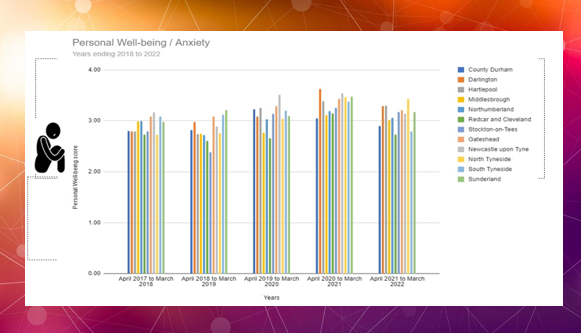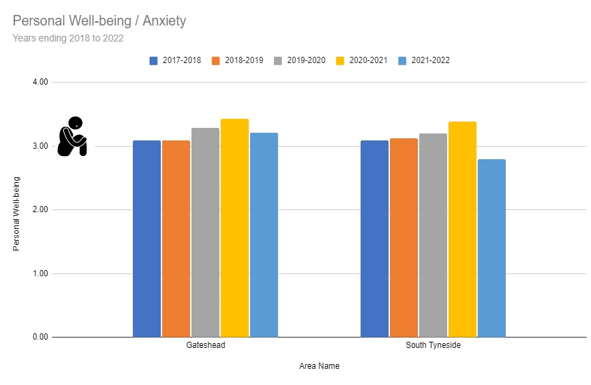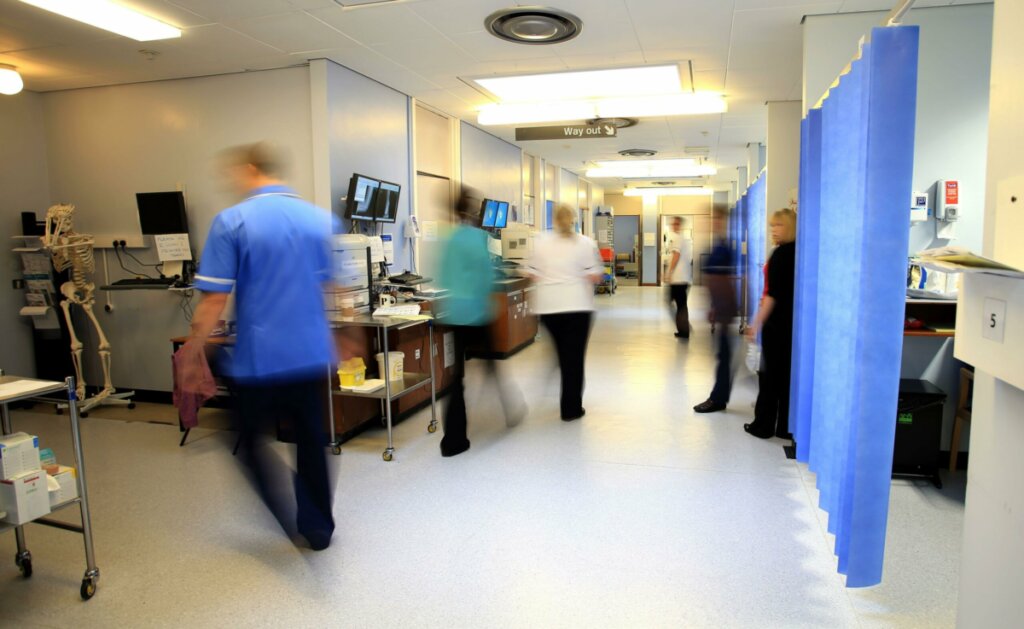North East average wellness score reveals stable anxiety levels in five years
Written by Godstime David on 26th April 2023
The anxiety level in the North East of England has remained at a steady average score over the past five years, according to findings.
Government data shows that individuals aged 16 and above in Durham, Darlington, Hartlepool, Middlesbrough, Northumberland, Redcar and Cleveland, Stockton-on-Tees, Gateshead, Newcastle, North Tyneside, South Tyneside, Sunderland, and North East have stayed on 2.00 to 3.54 during 2017 to 2021 on a scale of 0-10.
Although the average levels of anxiety may have remained relatively stable in these areas, the Covid-19 pandemic, uncertainties, social distancing measures, job losses, and financial stress led to widespread anxiety. This resulted in a sharp rise between 2019 and 2020. The general trend saw a notable decrease in 2021.

North East anxiety chat
Leigh Trimble, business manager at Red Balloons, a mental health charity in Stockton-on-Tees said: “People’s willingness to seek mental health services and express their emotions has increased post-Covid, indicating an improvement in mental health.”
“Prior to Covid-19, our services were delivered on a one-on-one basis, but during the pandemic, we switched to online services. However, we have now resumed in-person services in the form of smaller group sessions.
“Our doors have been seeing a monthly influx of at least 225 visitors over the past two years, compared to just 80 in 2019. There is a growing trend of people seeking mental health support by physically visiting our facility.
“In the midst of these, there has been an increase in the number of individuals who have not previously experienced mental health issues but are now experiencing anxiety due to various concerns such as coping with the rising cost of living and the struggle to survive. As of 2023, we have observed a notable increase in anxiety due to this trend.”
“We recognised that even during the Covid-19 pandemic, the demand for mental health services would remain high as it is an essential need. To prepare for this, we took proactive measures such as creating a more strategic approach, which we refer to as ‘walk and talk’ sessions,” she added.
Meanwhile, the data indicate that anxiety levels in the mentioned areas of the North East varied from 2020 to 2021. While Gateshead and South Tyneside had consistent levels above 3.01 from 2017 to 2020, which is slightly higher than most areas according to the data obtained from the Annual Population Survey, they remain in the average bracket of the statistics.

Gateshead and South Tyneside
A spokesperson for Gateshead Council said: “The most recent average for Gateshead was 3.21 which is still considered low. The score has been reduced since the previous year (during the height of the pandemic) and is now below pre-pandemic levels. Gateshead has the 4th highest score in the region,” she added.
In 2017, Sunderland had a rating of 2.98, which falls within the average range. However, the rating slightly increased to above 3 and remained at that level until 2021. Although this trend remains within the average range overall, it is considered high compared to Sunderland’s previous rating.
A spokesperson for the Sunderland City Council stated that they are currently exploring different modalities to effectively manage mental health.
“Mental health problems such as anxiety can affect anyone at any time and research has shown that one in four people can experience some form of mental illness during their life.
“The Sunderland City Council, the NHS, voluntary organisations, charities, and many others are all working together and in partnership for a more dynamic, healthier, and vibrant Sunderland as part of our ongoing City Plan.
“This year’s Mental Health Awareness Week takes place from May 15 to May 21 and the official theme, as set by the Mental Health Foundation, is ‘anxiety’.
“The aim is to help people and organisations to understand the difference between anxiety and anxiety disorders and to confidently seek and signpost each other to the right support.”
Meanwhile, Lea Cole, business manager at Impact North East, a mental health charity in Sunderland said: “Since the Covid lockdown was lifted, we have observed a significant increase in face-to-face clients seeking help for social anxiety. Additionally, we are seeing more individuals seeking assistance for anxiety caused by financial strains.”
“In the period between 2020-2021, we recorded 155 cases, which was an increase compared to previous years.
“However, between 2022 and the current date, we have recorded 220 cases, indicating a huge rise in anxiety.”
Despite the notable drop in anxiety rates in the aforementioned period, mental health awareness and support remain essential. By providing access to mental health resources, individuals can receive the necessary support to cope with the pandemic’s effects on their mental health.







